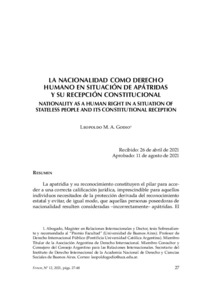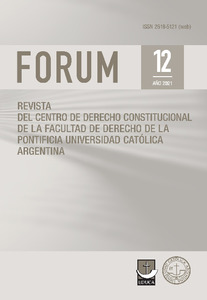Please use this identifier to cite or link to this item:
https://repositorio.uca.edu.ar/handle/123456789/13267| Título: | La nacionalidad como derecho humano en situación de apátridas y su recepción constitucional Nationality as a human right in a situation of stateless people and its constitutional reception |
Autor: | Godio, Leopoldo | Palabras clave: | NACIONALIDAD; EXTRANJEROS; DERECHOS HUMANOS; CONSTITUCION NACIONAL; DERECHO INTERNACIONAL; IGUALDAD ANTE LA LEY; DIGNIDAD HUMANA | Fecha de publicación: | 2021 | Editorial: | Pontificia Universidad Católica Argentina. Facultad de Derecho. Centro de Derecho Constitucional | Cita: | Godio, L. La nacionalidad como derecho humano en situación de apátridas y su recepción constitucional [en línea]. Forum. Revista del Centro de Derecho Constitucional de la Facultad de Derecho de la Pontificia Universidad Católica Argentina. 2021, 12. Disponible en: https://repositorio.uca.edu.ar/handle/123456789/13267 | Resumen: | Resumen: La apatridia y su reconocimiento constituyen el pilar para acceder
a una correcta calificación jurídica, imprescindible para aquellos
individuos necesitados de la protección derivada del reconocimiento
estatal y evitar, de igual modo, que aquellas personas poseedoras de
nacionalidad resulten consideradas –incorrectamente– apátridas. El trabajo constata la relación entre ambas instituciones y su posible recepción
en la Constitución Nacional de la República Argentina (1994),
así como su justificación dentro del denominado “Cuerpo de Derecho
Constitucional”, a partir de la última sentencia de la Corte Suprema
en esta materia. En conclusión: Argentina es un país que se rige por
el Estado de Derecho y su Constitución reconoce derechos a todo ser
humano. Cada persona tiene derecho a la igualdad ante la ley y a la
igual protección de las leyes. Abstract: Statelessness and its recognition institutes the support to access a correct legal qualification, essential for those individuals in need of protection resulting from State recognition and to avoid, likewise, that those who possess nationality are considered –incorrectly– as stateless. This work notes the relationship between both institutions and their possible reception in the National Constitution of the Argentine Republic (1994), as well as their justification within the so-called “Constitutional Body of Law”, from the last judgment of the Supreme Court on this matter. In conclusion: Argentina is a country governed by the Rule of Law and this Constitution recognizes rights on every human. Each person is entitled to equality before the law and equal protection of the laws. |
Cobertura Espacial: | Argentina | URI: | https://repositorio.uca.edu.ar/handle/123456789/13267 | ISSN: | 2718-6628 (en línea) | Disciplina: | DERECHO | Derechos: | Acceso abierto | Fuente: | Forum. Revista del Centro de Derecho Constitucional de la Facultad de Derecho de la Pontificia Universidad Católica Argentina. 2021, 12 |
| Appears in Collections: | FOR - 2021 nro. 12 |
Files in This Item:
| File | Description | Size | Format | |
|---|---|---|---|---|
| nacionalidad-derecho-humano.pdf | 161,6 kB | Adobe PDF |  View/Open | |
| portada.pdf | 692,71 kB | Adobe PDF |  View/Open |
Page view(s)
89
checked on Apr 27, 2024
Download(s)
272
checked on Apr 27, 2024
Google ScholarTM
Check
This item is licensed under a Creative Commons License

